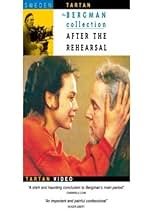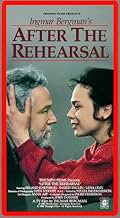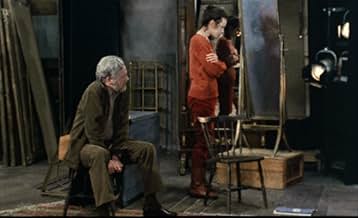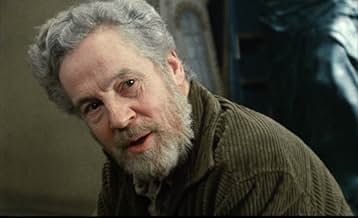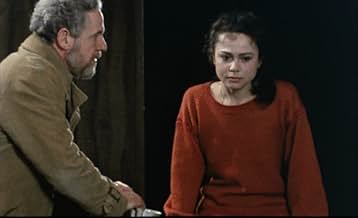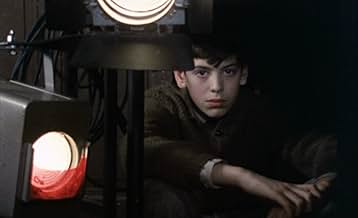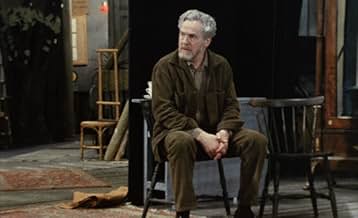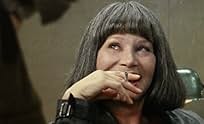IMDb-BEWERTUNG
7,1/10
3133
IHRE BEWERTUNG
Nach der Probe bleibt Regisseur Henrik Vogler nachdenklich im Theater. Als Anna, eine junge Schauspielerin, nochmal zurückkommt, entbrennt eine Debatte über intime und berufliche Probleme.Nach der Probe bleibt Regisseur Henrik Vogler nachdenklich im Theater. Als Anna, eine junge Schauspielerin, nochmal zurückkommt, entbrennt eine Debatte über intime und berufliche Probleme.Nach der Probe bleibt Regisseur Henrik Vogler nachdenklich im Theater. Als Anna, eine junge Schauspielerin, nochmal zurückkommt, entbrennt eine Debatte über intime und berufliche Probleme.
- Auszeichnungen
- 2 Nominierungen insgesamt
Empfohlene Bewertungen
This is only my second Ingmar Bergman viewing, the first being the magnificent "Seventh Seal", which left me with a long lasting impression. Perhaps it is not fair to compare this little ditty to the impressive, thoughtful epic that was the former film, but it was with such unrealistic expectations that I started watching "After the Rehearsal".
Unfortunately, I left the film disappointed and indifferent. The plot revolves around an aging play director's relation to his young lead actress, and concerns itself with acting, the personal relations of people in the profession, parenthood and estrangement. Alas, I'm afraid even my simplistic presentation makes the film sound far more interesting than it really is. In the end, "After the Rehearsal" only amounts to a monotonous (if articulate) study of romantic and interpersonal manipulation. I suppose viewers interested in acting and the theater might find something of interest in this movie, especially concerning the issues of what it means to act and direct, and how it affects persons of the field.
Personally, however, I was not engaged at all to the characters' petty personal issues, nor could I project parallels to issues larger than their own particular microcosm from their mundane -if eloquent- verbal sparring. If the "Sevent Seal"'s characters could be likened to those of Dostoyevsky's literature, "After the Rehearsal"'s protagonists would be more similar to Oscar Wilde's aestheticists and their monologues. Who do you prefer?
Unfortunately, I left the film disappointed and indifferent. The plot revolves around an aging play director's relation to his young lead actress, and concerns itself with acting, the personal relations of people in the profession, parenthood and estrangement. Alas, I'm afraid even my simplistic presentation makes the film sound far more interesting than it really is. In the end, "After the Rehearsal" only amounts to a monotonous (if articulate) study of romantic and interpersonal manipulation. I suppose viewers interested in acting and the theater might find something of interest in this movie, especially concerning the issues of what it means to act and direct, and how it affects persons of the field.
Personally, however, I was not engaged at all to the characters' petty personal issues, nor could I project parallels to issues larger than their own particular microcosm from their mundane -if eloquent- verbal sparring. If the "Sevent Seal"'s characters could be likened to those of Dostoyevsky's literature, "After the Rehearsal"'s protagonists would be more similar to Oscar Wilde's aestheticists and their monologues. Who do you prefer?
Here's a bit of an odd confession. I'm starting to like this Ingmar Bergman guy. Mind you, I've only seen two of his films (the other being Cries and Whispers) but he knows how to make a film, let me tell ya! After the Rehearsal is a great movie that makes you think, while marveling how clever the whole thing is. A theater director (played by Erland Josephson) is putting together a production called "The Dream Play". One of his actresses (Lena Olin) stays behind to talk to him about past experiences, his life and hers, and other existential topics. He does the same. A little while later an older actress comes on the scene, and essentially talks the same talk, only a little older but definitely not wiser. The interesting thing about this is, is that both women don't acknowledge the other.. So what's that about? Was this the same woman, only years later? Did these women exist at all, or are we indeed watching a "dream play" already? So many fascinating theories, I love it when a movie does that to me. The movie somewhat lags during the third act, but let me tell you, Bergman KNOWS how to end movies, like in Cries and Whispers and this one, it leaves some questions unanswered for us to figure out by ourselves, and Bergman seems to rejoice yanking us away from the story to go to the credits, which is great.
I want to see more! I will see more! Yay!
I want to see more! I will see more! Yay!
Fanny and Alexander, to Ingmar Bergman, IS his last released film, written and directed by him. But this film, which was originally meant only for Swedish television, found its way to the USA and abroad, and (excluding Saraband, which was a film that just had to be made by its maker) is a welcome piece of theater, about the theater. After the Rehearsal is a short, but extremely satisfying take on what it means to be a director, and what it means to act, or to just be in the profession of the imitation of life. Bergman gives us only three actors (two kids, who pop up only for a few moments, one of which the child who wonderfully played Alexander in the above title, is one of them), and all that happens is talk, and talk.
To one who may not be familiar well with Bergman, it may not be wise to go immediately to this film. That is, unless one is very much in love with the theater. The filmmaker, who was also a major producer and director of countless theatrical production, is able to suffuse his personal views, good and bad, on the process, or the lack thereof. Interesting too is how his lead male, Henrik (Erland Josephsson, one of Bergman's most recognizable and accessible talents), has a conversation not just with an aspiring actress (Lena Olin), but also his ex-wife (Ingrid Thulin, also one of the magnificent women from Bergman's repertory company), to explore his past and present difficulties.
There is so much that Bergman brings to the table to discuss about the theater in this film, and in such a short running time, that it might be moot to delve very far into his what certain things may or may not 'mean'. Like many of the director's films, it's dramatic structure that tries to get behind the surfaces of what lies in seemingly one or two-sided characters. Henrik, at times, is given voice-over narration where he questions what he's saying, sometimes in anger or despair, to this young actress. Or, when his love (Thulin) is shown to be somewhat compassionate even as she seems a little crazed or, in fact, lonely. As Henrik and his pupil talk (not rehearse, of course) about why they are there, it becomes strikingly existential even when it's not meant to be. Olin is brilliant in the opposing side of Josephsson's often calm but boiling persona, as she tries to figure out what it is this director wants out of her.
When it comes down to it, Bergman is not only asking questions about the theater and the people in it, but also about human nature in its role of the theater. While this could sound like subject matter to scare or (worse) bore away some viewers, if you give the film enough patience for the 72 minutes (that seem to fill each minute with enough substance for an average work twice its length), it serves its purpose well enough to not be disregarded as an important later work in Bergman's career. And, by the way, if you're young (i.e. under 17) and have some reason to want to check this out, don't let the R rating deter you; it's one of the most un-necessarily R-rated films ever (for a brief flash of nudity, which could very well even be given a PG rating). A+
To one who may not be familiar well with Bergman, it may not be wise to go immediately to this film. That is, unless one is very much in love with the theater. The filmmaker, who was also a major producer and director of countless theatrical production, is able to suffuse his personal views, good and bad, on the process, or the lack thereof. Interesting too is how his lead male, Henrik (Erland Josephsson, one of Bergman's most recognizable and accessible talents), has a conversation not just with an aspiring actress (Lena Olin), but also his ex-wife (Ingrid Thulin, also one of the magnificent women from Bergman's repertory company), to explore his past and present difficulties.
There is so much that Bergman brings to the table to discuss about the theater in this film, and in such a short running time, that it might be moot to delve very far into his what certain things may or may not 'mean'. Like many of the director's films, it's dramatic structure that tries to get behind the surfaces of what lies in seemingly one or two-sided characters. Henrik, at times, is given voice-over narration where he questions what he's saying, sometimes in anger or despair, to this young actress. Or, when his love (Thulin) is shown to be somewhat compassionate even as she seems a little crazed or, in fact, lonely. As Henrik and his pupil talk (not rehearse, of course) about why they are there, it becomes strikingly existential even when it's not meant to be. Olin is brilliant in the opposing side of Josephsson's often calm but boiling persona, as she tries to figure out what it is this director wants out of her.
When it comes down to it, Bergman is not only asking questions about the theater and the people in it, but also about human nature in its role of the theater. While this could sound like subject matter to scare or (worse) bore away some viewers, if you give the film enough patience for the 72 minutes (that seem to fill each minute with enough substance for an average work twice its length), it serves its purpose well enough to not be disregarded as an important later work in Bergman's career. And, by the way, if you're young (i.e. under 17) and have some reason to want to check this out, don't let the R rating deter you; it's one of the most un-necessarily R-rated films ever (for a brief flash of nudity, which could very well even be given a PG rating). A+
Here's an interesting little movie with a cast of three, set entirely on a stage, and that jumps backwards and forwards in time.
Henrik is a theater director spending some time alone on the stage after a rehearsal of A Dream Play by August Strindberg. He wants to collect himself before he returns to his domicile to take a nap prior to that night's rehearsal. As he sits there, one of his actresses, Anna, arrives on stage with a thin story of looking for a bracelet. What follows is a long conversation between the two that swirls around topics as it operates as some kind of seduction, direction, and exploration of the other.
About a third of the way through, something happens that is quite jarring at first. Another woman shows up on stage. This is Rakel, Anna's mother who has been dead for ten years. Anna sits on the couch watching the scene without moving or speaking, and we soon deduce that Henrik is playing out a conversation he had had with Rakel eleven years before, just prior to her death.
Rakel was a great actress in her day. She played the same role Anna is playing to great acclaim, but she had Anna and quit acting. At the time of the conversation, she's living in a hospital and the small role she's playing (the mother) is almost an act of pity on the part of Henrik. He used to love her, but she spurned his affections before. However, in this conversation, she throws herself at him, and Henrik cannot stand it. He eventually makes an empty promise to follow her to her room, but we get the impression that there's going to be no encounter.
The conversation returns to Anna as Henrik takes up the exact same position he had been in when Rakel had walked on, implying that what we had seen was just a memory that had passed in a flash. In this final third of the film, souls are bared and dark revelations of Anna's recent past come out. There are protestations of love and hate. It's a swirl of emotions that's surprisingly effective.
The movie ends when the camera suddenly cuts to a new view we haven't seen before. The movie has almost entirely shot with cameras from the audience pit, but the final shot is to the stage from the side. We see a giant brick wall and the director and young actress small against it. The conversation even changes tenor becoming more professional in nature than emotional. Something's drastically changed.
Early in the movie, Henrik talks about how he's willing to do anything to work with actors (whom he loves) in order to help them reach their potential. He looks like he's playing in their field, but he's never really involved. So, at that final shot, those words came back to me, and I asked, "Was it all an act?" Were the high emotions and swings all about directing his actor?
It's an interesting exploration of the relationship between directors and actors, something obviously intimately familiar to Bergman. Watching the movie, it became obvious how Bergman could strike up so many affairs with so many of his actresses, and, at the same time, how they could all fall apart in the end. Still, the movie is a little insular to acting specifically which limits its broad appeal. It's a good little movie, a fascinating little footnote in Bergman's career.
Henrik is a theater director spending some time alone on the stage after a rehearsal of A Dream Play by August Strindberg. He wants to collect himself before he returns to his domicile to take a nap prior to that night's rehearsal. As he sits there, one of his actresses, Anna, arrives on stage with a thin story of looking for a bracelet. What follows is a long conversation between the two that swirls around topics as it operates as some kind of seduction, direction, and exploration of the other.
About a third of the way through, something happens that is quite jarring at first. Another woman shows up on stage. This is Rakel, Anna's mother who has been dead for ten years. Anna sits on the couch watching the scene without moving or speaking, and we soon deduce that Henrik is playing out a conversation he had had with Rakel eleven years before, just prior to her death.
Rakel was a great actress in her day. She played the same role Anna is playing to great acclaim, but she had Anna and quit acting. At the time of the conversation, she's living in a hospital and the small role she's playing (the mother) is almost an act of pity on the part of Henrik. He used to love her, but she spurned his affections before. However, in this conversation, she throws herself at him, and Henrik cannot stand it. He eventually makes an empty promise to follow her to her room, but we get the impression that there's going to be no encounter.
The conversation returns to Anna as Henrik takes up the exact same position he had been in when Rakel had walked on, implying that what we had seen was just a memory that had passed in a flash. In this final third of the film, souls are bared and dark revelations of Anna's recent past come out. There are protestations of love and hate. It's a swirl of emotions that's surprisingly effective.
The movie ends when the camera suddenly cuts to a new view we haven't seen before. The movie has almost entirely shot with cameras from the audience pit, but the final shot is to the stage from the side. We see a giant brick wall and the director and young actress small against it. The conversation even changes tenor becoming more professional in nature than emotional. Something's drastically changed.
Early in the movie, Henrik talks about how he's willing to do anything to work with actors (whom he loves) in order to help them reach their potential. He looks like he's playing in their field, but he's never really involved. So, at that final shot, those words came back to me, and I asked, "Was it all an act?" Were the high emotions and swings all about directing his actor?
It's an interesting exploration of the relationship between directors and actors, something obviously intimately familiar to Bergman. Watching the movie, it became obvious how Bergman could strike up so many affairs with so many of his actresses, and, at the same time, how they could all fall apart in the end. Still, the movie is a little insular to acting specifically which limits its broad appeal. It's a good little movie, a fascinating little footnote in Bergman's career.
"After the Rehearsal was meant to be a pleasant little episode on my road toward death. ... (It) had a lot to do with my attitude and my relationship with the theater and the actors, with this dirty, dubious, fantastic, incredible, and cruel profession. That's all." -- Ingmar Bergman
Ingmar Bergman, age 66 and a couple years after his final feature film, Fanny and Alexander, was active in theater work and had a few TV movies left in him, of which this film is one. It takes place on a single set, a stage, has just three characters, and has the feeling of a simple play itself. It starts slowly but bear with it, it's only 73 minutes and finishes well.
Erland Josephson plays a theater director (without a doubt Bergman himself), who is musing in the empty theater after a rehearsal one day. His leading lady (Lena Olin) shows up on the pretext of looking for her bracelet; she's young enough to be his daughter, but has an interest in him. The two talk about their craft but also their personal lives, and as we come to understand that her mother worked with and loved him, she's conjured up in his imagination (Ingrid Thulin). It was a treat to see all three of these actors but maybe Thulin most of all, who at 58 has her character voice the sadness of aging, echoing the theater director in the present, even though she's still quite beautiful.
While it seemed a little bit vain of Bergman to have both the older and younger woman want him, er, the director sexually, the conversations build in momentum until with Olin he imagines the course their relationship would take if they gave in to their desire. It feels autobiographical and honest, helping to make up for a work that otherwise feels rather staid and erudite. While the film doesn't live up to its full potential, it's worth watching, especially if you're a Bergman fan.
Some quotes: "At my age, sometimes when you lean forward, your head suddenly finds itself in another reality. The dead are no longer dead. The living appear like ghosts. What was obvious a minute earlier becomes peculiar and hard to grasp."
"I'll tell you the pure and simple truth: I love actors. I love them as phenomena. I love their profession. I love their courage, or their contempt for death, whatever you want to call it. I understand their desire to escape, but also their dark, ruthless honesty."
"I hate turmoil, aggression, and outbursts of emotion. I administrate, distribute, and organize. I don't participate in the drama, I give it material form. I hate all things spontaneous, rash, and imprecise. I have no room for my own confusion except as a key to secrets of a script or as a stimulus for the creativity of actors."
"Nurture your childishness. It's a good filter against consciousness."
Ingmar Bergman, age 66 and a couple years after his final feature film, Fanny and Alexander, was active in theater work and had a few TV movies left in him, of which this film is one. It takes place on a single set, a stage, has just three characters, and has the feeling of a simple play itself. It starts slowly but bear with it, it's only 73 minutes and finishes well.
Erland Josephson plays a theater director (without a doubt Bergman himself), who is musing in the empty theater after a rehearsal one day. His leading lady (Lena Olin) shows up on the pretext of looking for her bracelet; she's young enough to be his daughter, but has an interest in him. The two talk about their craft but also their personal lives, and as we come to understand that her mother worked with and loved him, she's conjured up in his imagination (Ingrid Thulin). It was a treat to see all three of these actors but maybe Thulin most of all, who at 58 has her character voice the sadness of aging, echoing the theater director in the present, even though she's still quite beautiful.
While it seemed a little bit vain of Bergman to have both the older and younger woman want him, er, the director sexually, the conversations build in momentum until with Olin he imagines the course their relationship would take if they gave in to their desire. It feels autobiographical and honest, helping to make up for a work that otherwise feels rather staid and erudite. While the film doesn't live up to its full potential, it's worth watching, especially if you're a Bergman fan.
Some quotes: "At my age, sometimes when you lean forward, your head suddenly finds itself in another reality. The dead are no longer dead. The living appear like ghosts. What was obvious a minute earlier becomes peculiar and hard to grasp."
"I'll tell you the pure and simple truth: I love actors. I love them as phenomena. I love their profession. I love their courage, or their contempt for death, whatever you want to call it. I understand their desire to escape, but also their dark, ruthless honesty."
"I hate turmoil, aggression, and outbursts of emotion. I administrate, distribute, and organize. I don't participate in the drama, I give it material form. I hate all things spontaneous, rash, and imprecise. I have no room for my own confusion except as a key to secrets of a script or as a stimulus for the creativity of actors."
"Nurture your childishness. It's a good filter against consciousness."
Wusstest du schon
- WissenswertesIngmar Bergman was so impressed when he met Lena Olin for the first time that he wrote the part of Anna especially for her.
Top-Auswahl
Melde dich zum Bewerten an und greife auf die Watchlist für personalisierte Empfehlungen zu.
Details
Box Office
- Weltweiter Bruttoertrag
- 942 $
Zu dieser Seite beitragen
Bearbeitung vorschlagen oder fehlenden Inhalt hinzufügen


